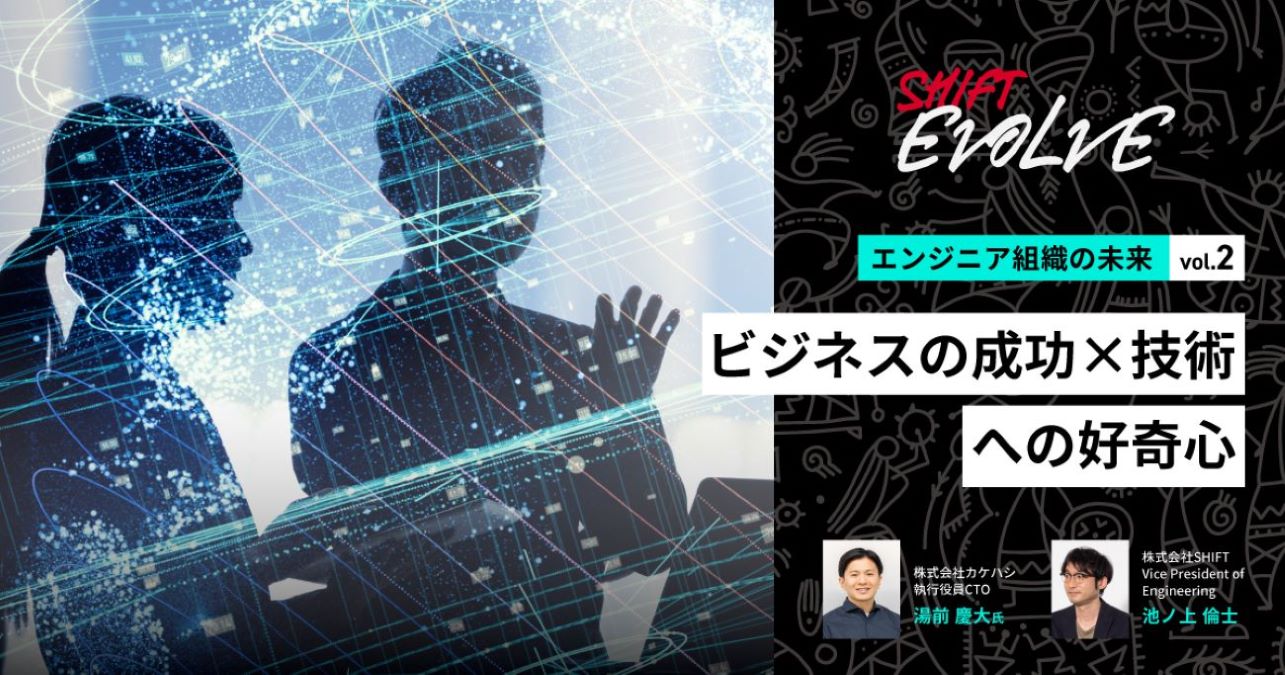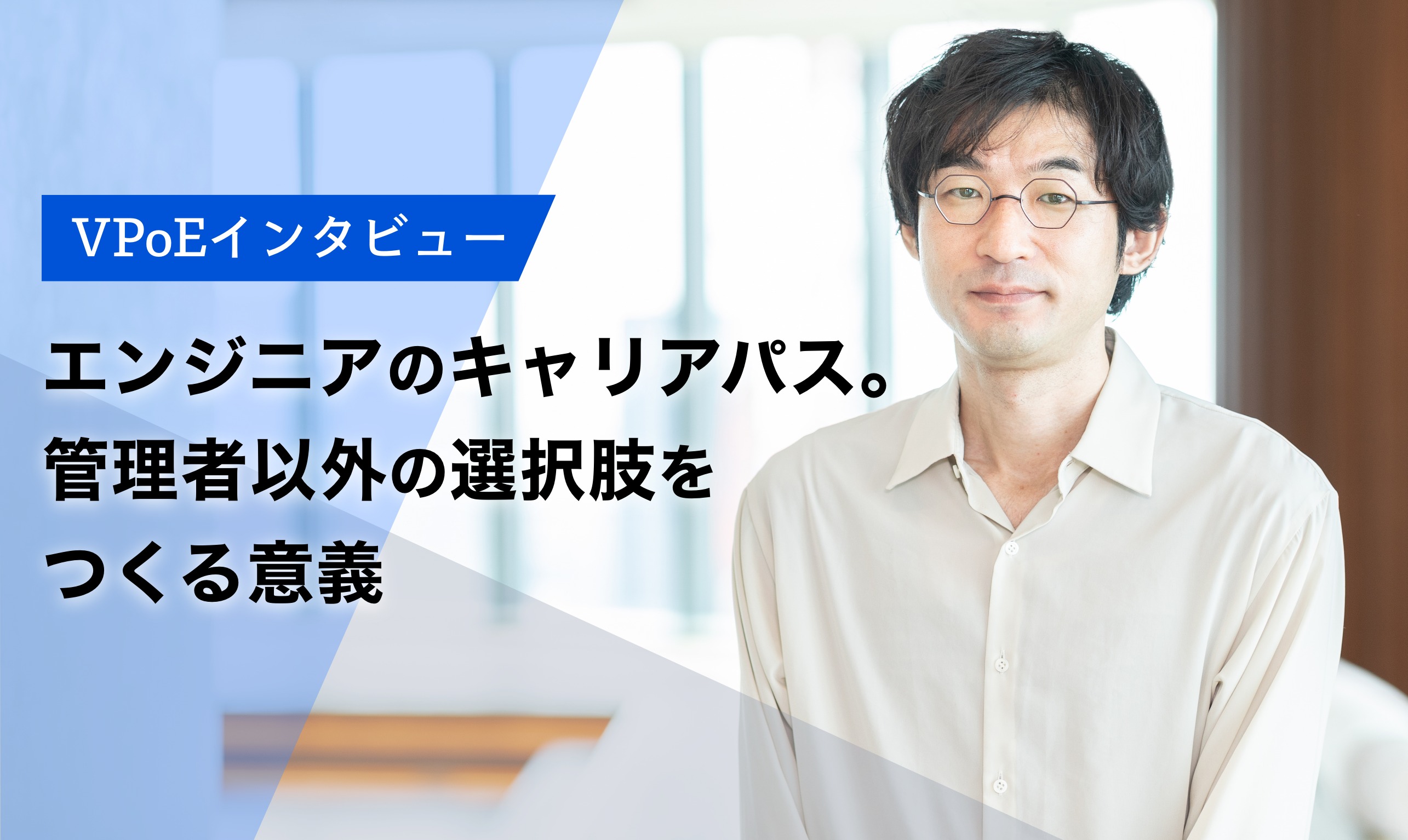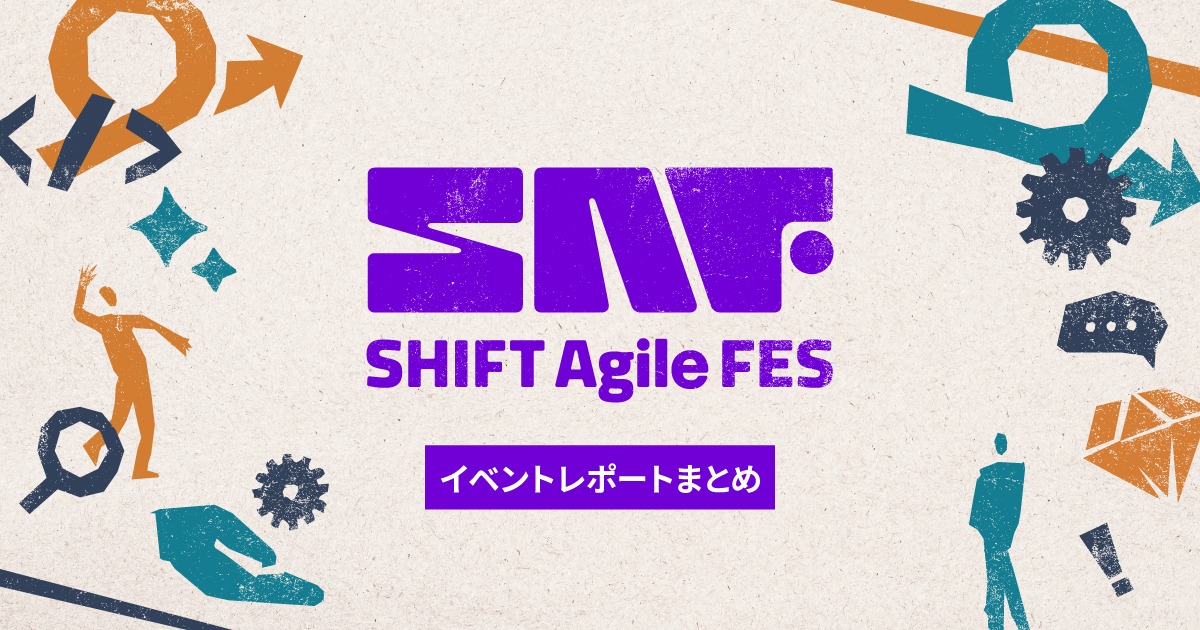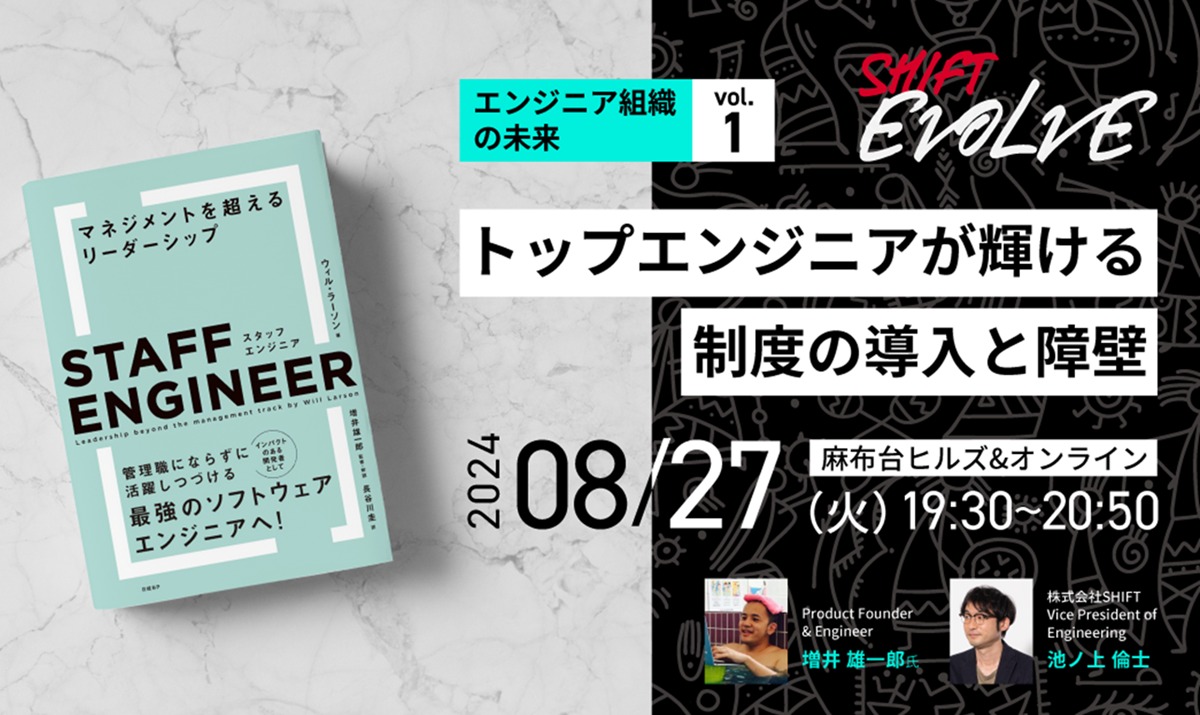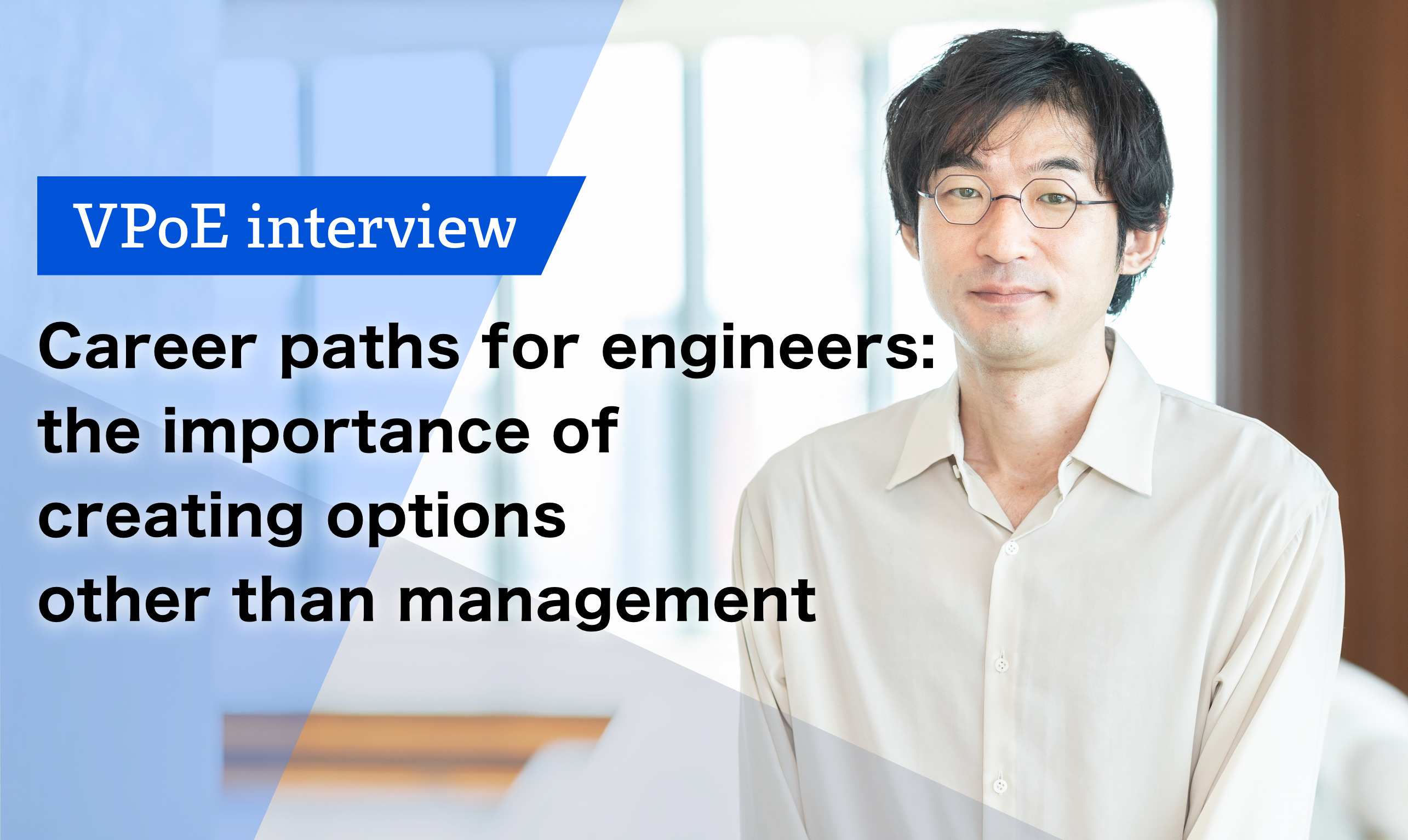
Career paths for engineers: the importance of creating options other than management
For engineers, designing a career path can feel like a neverending challenge. With the rapid advancement and diversification of technology in recent years, the range of technical options continues to expand.
However, many engineers may be unsure about which roles and experiences to pursue while engaging with these technologies.
To explore this topic of career paths for engineers, we spoke with Rinto Ikenoue, SHIFT’s VPoE.
What efforts is SHIFT making to help each engineer shine, and what role does continuous learning play? What kind of environment is being established to support this?
And beyond individual careers, what is the greater “purpose” behind it all?
Ayana Chandler (Ayanaru), who runs several technology conferences and communities, will serve as the interviewer for this in-depth conversation.
-
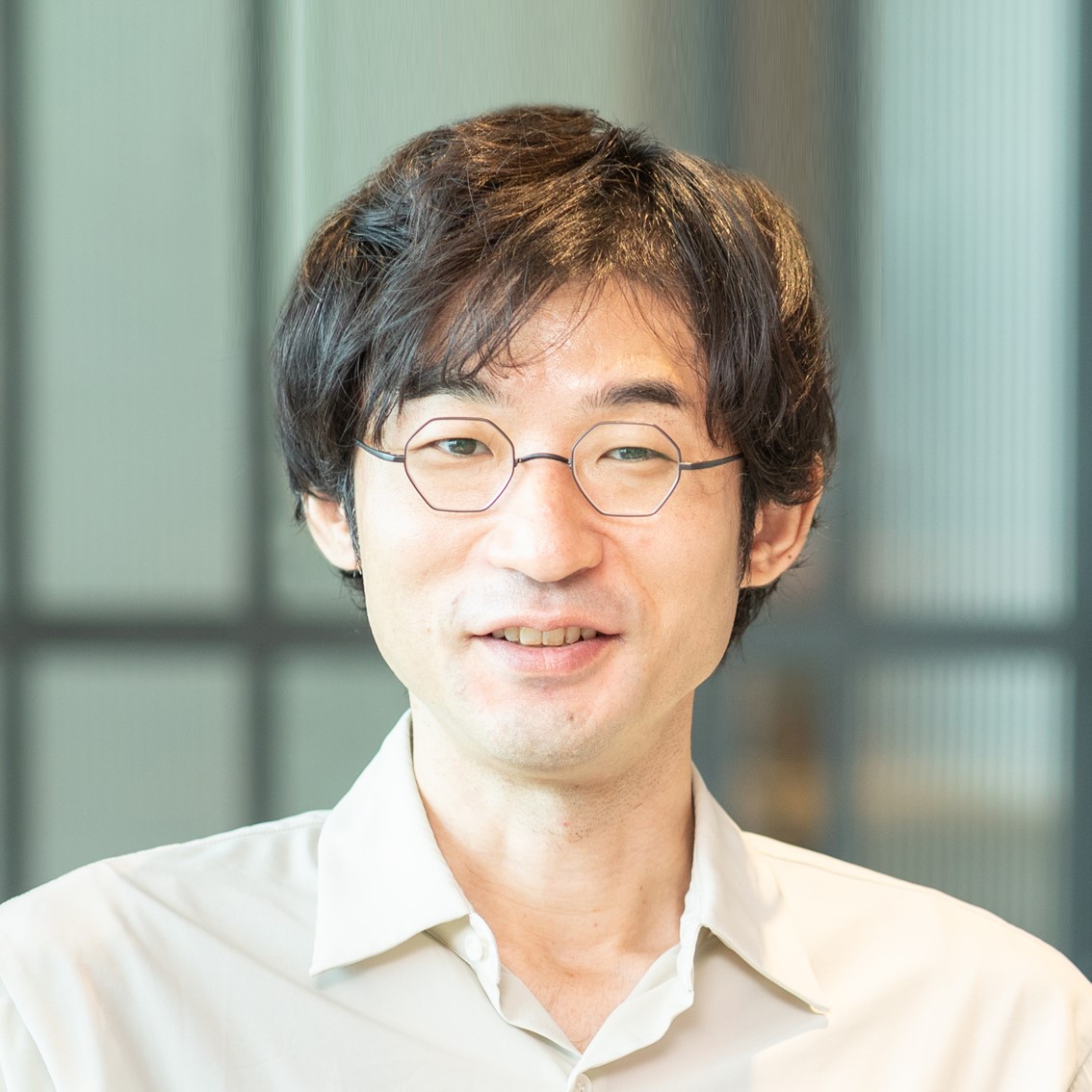
VPoE, Rinto Ikenoue
He began his career at an SIer where he was on-site at a web service provider, handling the development, maintenance, and operation of EC systems. From there, he moved to a venture company as part of the technology strategy office in the corporate planning department, doing IT implementation, service product development, and group management. Since joining SHIFT in 2017, he has held roles in the Technology Development Department, Service Promotion Department, Technology Advancement Department, and Technology Management Department. After serving as Head of the Technology Management Department, leading the adoption and establishment of modern development practices such as test automation and Agile development, he was promoted to Vice President of Engineering (VPoE).
-
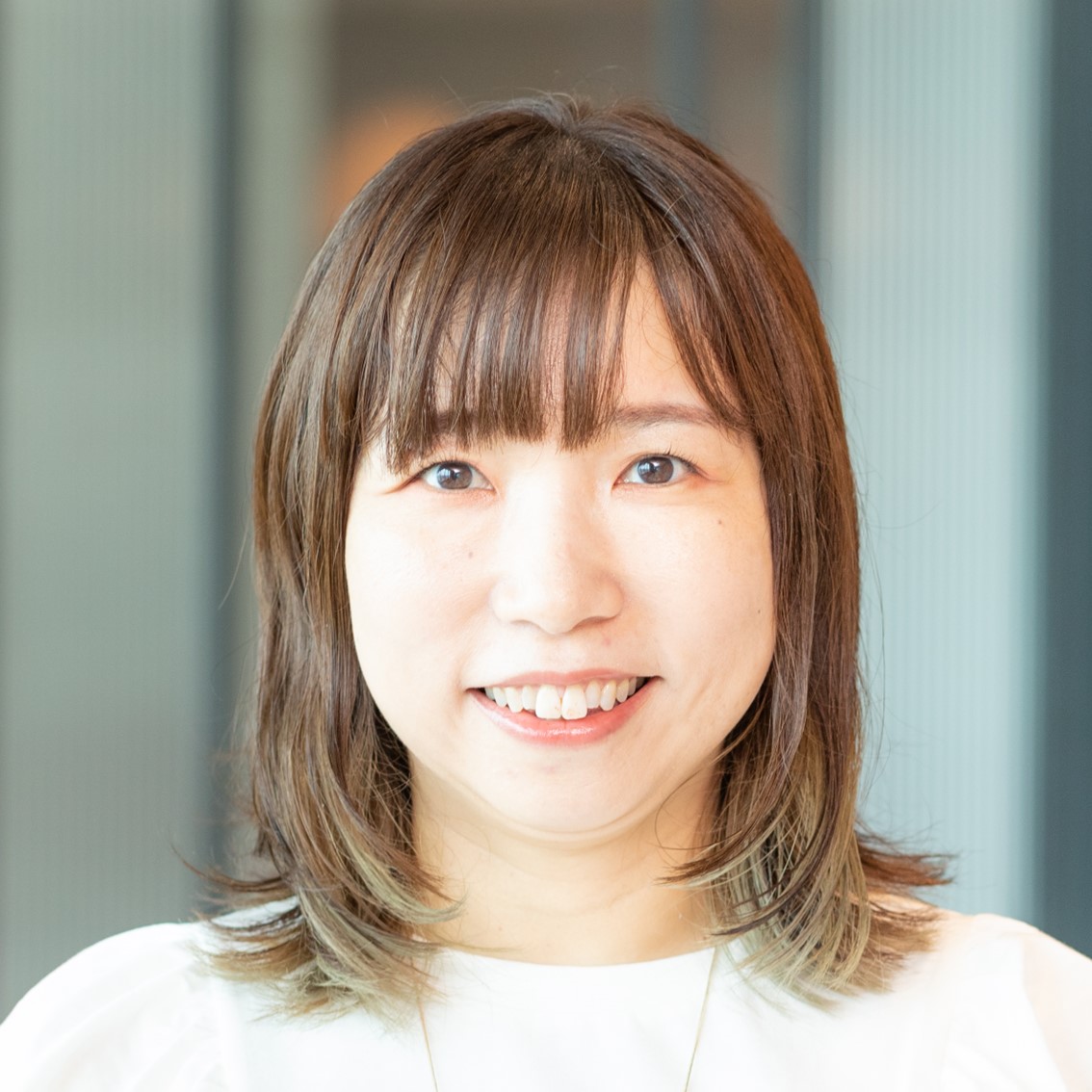
HR Strategy Division, Ayana Chandler (Ayanaru)
As Learning Coordinator and Representative Director of Agile Japan EXPO, she is actively working to create learning opportunities with engineers for engineers.
Table of Contents
Skill development is part of the culture—a place where “learning in a fun way” is the norm
Ayanaru: Before I joined in April, I had the impression that SHIFT is a testing and quality assurance company that had recently started focusing on Agile.
But when I became a member of the team, I was surprised to find that there are also experts in other fields such as cloud computing, security, and AI.
Ikenoue: Many small ventures specialize in trendy technologies, but SHIFT is more like a general trading company.
At the same time, we are not a huge SIer, and I think being somewhere in the middle is attractive to engineers.
We traditionally operated as a “quality assurance company,” but we have declared ourselves to be a “DX partner” for our clients, and now we are also focusing on DX support.
That announcement came when the Ministry of Economy, Trade and Industry had just released its DX report, and global attention to DX was rapidly increasing.
We have been deepening the discussion on “What is DX?” and expanding the necessary services.
Ayanaru: I think it’s amazing that so many experts have come together in such a short time. SHIFT’s recruiting capabilities are really impressive.
Ikenoue: Of course, there is hiring, but another factor is M&A.
SHIFT engages in a lot of function-based M&A, bringing companies with both technical expertise and aligned values into the group. I think that’s a key factor in achieving such diverse technical capabilities.
Then there are the internal efforts. Everyone is studying really hard.
Ayanaru: It’s true that SHIFT members show a strong desire to learn.
I coordinate SHIFT’s internal study sessions and external meetups, and I feel our employee’s participation rate and enthusiasm at these events is extremely high.
This learning environment is well-established in the company culture, isn’t it?
Ikenoue: For me, engineering is a profession for people who enjoy learning.
I think it’s essential for the company culture that each person studies naturally, without being forced to do so by anyone, and that ongoing learning is considered a given.
On top of that, SHIFT is also very proactive in strategically promoting its engineers.
Ayanaru: We host events, sponsor conferences, write technical blogs, and all of those activities encourage engineers to “get out there” more.
The culture of studying at your own pace and showcasing that knowledge externally is something I’ve felt right from the moment I joined.
Ikenoue: These efforts to promote engineers to the outside world have been consistent for a long time.
When I spoke with our CEO, Masaru Tange, about this shortly after joining the company, he said, “Of course, that’s the way it should be.”
I had seen many companies up to that point, but I remember feeling amazed that SHIFT shared knowledge at such a large scale.
I think the CEO’s ideas naturally took root as a culture of learning and open communication.
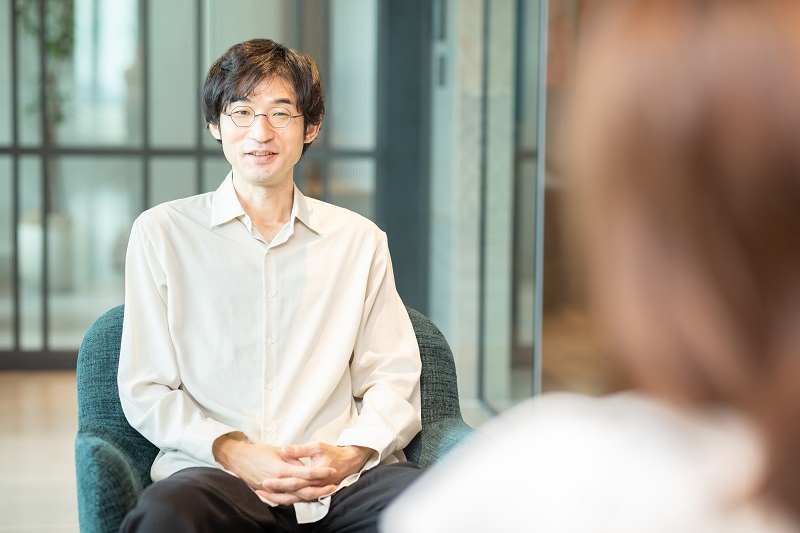
New businesses and services are constantly being developed, making it easy to create new career paths and positions
Ayanaru: From your point of view, what kind of careers do you think most engineers at SHIFT aspire to?
Ikenoue: For example, people like myself who are part of Agile teams or cloud teams with open-source technology stacks are probably eager to use new technologies to succeed both from a business and a product-development perspective.
They want to lead those technologies and become pioneers in their field.
Ayanaru: What kinds of backgrounds do your team members have?
Ikenoue: It varies, but many SIers have joined us.
The more members of an SIer are on the front lines, the more they have fresh ideas about “how we can succeed” and want to do things more efficiently, but I think some aspects of the business process compel them to do things the old-fashioned way.
I believe many people come to SHIFT looking for an exit from such places.
Ayanaru: SHIFT still has a venture spirit and is an environment where you can take on new challenges, but it is also becoming a large company, so your work can have a broader social impact at the same time.
I think many people are attracted to both sides of the coin.
Ikenoue: At SHIFT, we are working hard to tackle new technologies, and when it comes to AI, for example, young people are suddenly taking on the role of project leader.
The newer the technical area, it’s less likely that there will be an experience gap, so if you work hard, you can put yourself in a position to lead the project.
As the company develops its various businesses, we believe new career paths will also emerge.
A career as a “staff engineer” who is a specialist/expert in a particular field
Ayanaru: In terms of careers, I get the impression that most engineers are not so concerned with their role, but want to pursue their skill development or perfect their technology.
How does SHIFT create roles that allow every engineer to shine?
Ikenoue: That is exactly where we want to incorporate the “staff engineer” concept.
Let me start by giving a little background. In Japan, IT vendors and business companies typically have a clear separation, and most engineers work for IT vendors.
On the other hand, in the United States, for example, many engineers are employed by business companies, and their IT literacy is just as high as that of vendors.
I believe this is one of the reasons why Japan’s IT industry is not making much progress. If you ask, Why are there so few engineers in Japanese businesses? Put simply, it’s because there are no careers.
Ayanaru: What do you mean by, “there are no careers?”
Ikenoue: When engineers get a job at an operating company, they are often assigned to the information systems department.
For many Japanese companies, that is an administrative department. The main task is to procure and manage IT equipment and systems, and its main business KPI is cost reduction.
In other words, although there is now a movement to invest in IT to grow the business, generally speaking, if you tried to expand the business by incurring costs, you would meet a lot of resistance.
On the other hand, IT vendors have a model of trying to get as much work from their customers as possible, which leads to a dynamic where the technical aspects become something of a “black box.”
In this way, the environment surrounding engineers in Japan has been segregated by a clear division of roles: business is handled by operating companies, while technical matters are left to IT vendors.
In this context, SHIFT’s basic premise is that if you want to advance your career and grow your business, you need both. You have to understand the business, not just the engineering and vice versa.
Ayanaru: How do the staff engineers you mentioned earlier fit into that?
Ikenoue: Essentially, we are establishing specialists/experts in each field.
We are currently working on creating a knowledge management system that gathers the challenges arising daily in the field and the know-how to address them.
By leveraging the technical expertise accumulated at SHIFT, we aim to create career paths for specialists by appointing individuals who demonstrate leadership as staff engineers or, at a higher level, as distinguished engineers.
We expect these staff engineers to play roles beyond just being technically proficient.
They should teach others, actively share information inside and outside the company to contribute to the industry, and sometimes step into troubled projects to resolve critical issues.
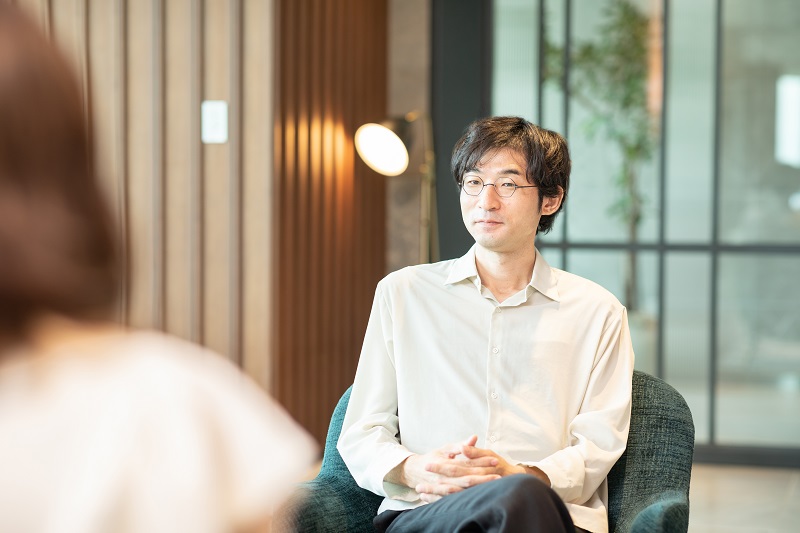
To build career security, become an engineer who contributes to business creation and growth
Ayanaru: When there are great engineers on a team, they often end up being promoted into leadership and given management responsibilities, which can be a struggle for someone who wants to focus on technical work.
As an alternative to that path, SHIFT is trying to create a system where individuals with advanced skills are given titles, recognized as experts, and rewarded through links to their salaries and career development.
Ikenoue: What’s important here is a mindset that SHIFT has always valued––paying talented people a fair salary.
If you try to implement roles like staff engineer under the fundamental premise of “understanding both business and technology,” it naturally leads to an increase in their market value.
In this regard, determining salaries based on market value is part of SHIFT’s culture and one of its strengths.
Ayanaru: While honing their technical skills, they spread the know-how they have cultivated within the company, the industry, and beyond, contributing to the business and clients.
Ensuring that these activities are reflected in salaries would be truly impressive. There are still very few companies that have achieved this level; is that right?
Ikenoue: Various companies have tried to do this many times, but in the end, large companies only operate in a research department-like manner.
I suppose the barrier is the “duality of engineering and business” that I mentioned earlier.
Research departments are the first to be downsized when a recession hits.
From the perspective of building an engineering team that truly contributes to business growth, we need to establish a proper system for staff engineers.
Otherwise, it would not be a stable career for an engineer.
Ayanaru: I see. Now that you’ve made the bold move as the technical leader at SHIFT, it’s crucial to follow through and make it happen (laughs).
Ikenoue: When we look at the situation we’re in, it seems that innovative IT practices and technologies from overseas are emerging, and the businesses that have successfully leveraged these are really making an impact.
For better or worse, if we were to try to copy them exactly, we would never be successful, so we need to create our own practices and build our own business. We will continue to work hard towards that goal.
Ayanaru: Thank you very much for your time today!
(*The content of this article and the affiliations of the interviewees are as of the time of the interview.)








